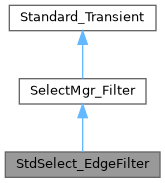A framework to define a filter to select a specific type of edge. The types available include: More...
#include <StdSelect_EdgeFilter.hxx>

Public Member Functions | |
| StdSelect_EdgeFilter (const StdSelect_TypeOfEdge Edge) | |
| Constructs an edge filter object defined by the type of edge Edge. | |
| void | SetType (const StdSelect_TypeOfEdge aNewType) |
| Sets the type of edge aNewType. aNewType is to be highlighted in selection. | |
| StdSelect_TypeOfEdge | Type () const |
| Returns the type of edge to be highlighted in selection. | |
| virtual Standard_Boolean | IsOk (const Handle< SelectMgr_EntityOwner > &anobj) const override |
| Indicates that the selected Interactive Object passes the filter. The owner, anObj, can be either direct or user. A direct owner is the corresponding construction element, whereas a user is the compound shape of which the entity forms a part. When an object is detected by the mouse - in AIS, this is done through a context selector - its owner is passed to the filter as an argument. If the object returns Standard_True, it is kept; if not, it is rejected. If you are creating a filter class inheriting this framework, and the daughter class is to be used in an AIS local context, you will need to implement the virtual function ActsOn. | |
| virtual Standard_Boolean | ActsOn (const TopAbs_ShapeEnum aStandardMode) const override |
| Returns true in an AIS local context, if this filter operates on a type of subshape defined in a filter class inheriting this framework. This function completes IsOk in an AIS local context. | |
 Public Member Functions inherited from Standard_Transient Public Member Functions inherited from Standard_Transient | |
| Standard_Transient () | |
| Empty constructor. | |
| Standard_Transient (const Standard_Transient &) | |
| Copy constructor – does nothing. | |
| Standard_Transient & | operator= (const Standard_Transient &) |
| Assignment operator, needed to avoid copying reference counter. | |
| virtual | ~Standard_Transient () |
| Destructor must be virtual. | |
| virtual const opencascade::handle< Standard_Type > & | DynamicType () const |
| Returns a type descriptor about this object. | |
| Standard_Boolean | IsInstance (const opencascade::handle< Standard_Type > &theType) const |
| Returns a true value if this is an instance of Type. | |
| Standard_Boolean | IsInstance (const Standard_CString theTypeName) const |
| Returns a true value if this is an instance of TypeName. | |
| Standard_Boolean | IsKind (const opencascade::handle< Standard_Type > &theType) const |
| Returns true if this is an instance of Type or an instance of any class that inherits from Type. Note that multiple inheritance is not supported by OCCT RTTI mechanism. | |
| Standard_Boolean | IsKind (const Standard_CString theTypeName) const |
| Returns true if this is an instance of TypeName or an instance of any class that inherits from TypeName. Note that multiple inheritance is not supported by OCCT RTTI mechanism. | |
| Standard_Transient * | This () const |
| Returns non-const pointer to this object (like const_cast). For protection against creating handle to objects allocated in stack or call from constructor, it will raise exception Standard_ProgramError if reference counter is zero. | |
| Standard_Integer | GetRefCount () const noexcept |
| Get the reference counter of this object. | |
| void | IncrementRefCounter () noexcept |
| Increments the reference counter of this object. | |
| Standard_Integer | DecrementRefCounter () noexcept |
| Decrements the reference counter of this object; returns the decremented value. | |
| virtual void | Delete () const |
| Memory deallocator for transient classes. | |
Additional Inherited Members | |
 Public Types inherited from Standard_Transient Public Types inherited from Standard_Transient | |
| typedef void | base_type |
| Returns a type descriptor about this object. | |
 Static Public Member Functions inherited from Standard_Transient Static Public Member Functions inherited from Standard_Transient | |
| static constexpr const char * | get_type_name () |
| Returns a type descriptor about this object. | |
| static const opencascade::handle< Standard_Type > & | get_type_descriptor () |
| Returns type descriptor of Standard_Transient class. | |
Detailed Description
A framework to define a filter to select a specific type of edge. The types available include:
- any edge
- a linear edge
- a circular edge.
Constructor & Destructor Documentation
◆ StdSelect_EdgeFilter()
| StdSelect_EdgeFilter::StdSelect_EdgeFilter | ( | const StdSelect_TypeOfEdge | Edge | ) |
Constructs an edge filter object defined by the type of edge Edge.
Member Function Documentation
◆ ActsOn()
|
overridevirtual |
Returns true in an AIS local context, if this filter operates on a type of subshape defined in a filter class inheriting this framework. This function completes IsOk in an AIS local context.
Reimplemented from SelectMgr_Filter.
◆ IsOk()
|
overridevirtual |
Indicates that the selected Interactive Object passes the filter. The owner, anObj, can be either direct or user. A direct owner is the corresponding construction element, whereas a user is the compound shape of which the entity forms a part. When an object is detected by the mouse - in AIS, this is done through a context selector - its owner is passed to the filter as an argument. If the object returns Standard_True, it is kept; if not, it is rejected. If you are creating a filter class inheriting this framework, and the daughter class is to be used in an AIS local context, you will need to implement the virtual function ActsOn.
Implements SelectMgr_Filter.
◆ SetType()
| void StdSelect_EdgeFilter::SetType | ( | const StdSelect_TypeOfEdge | aNewType | ) |
Sets the type of edge aNewType. aNewType is to be highlighted in selection.
◆ Type()
| StdSelect_TypeOfEdge StdSelect_EdgeFilter::Type | ( | ) | const |
Returns the type of edge to be highlighted in selection.
The documentation for this class was generated from the following file: